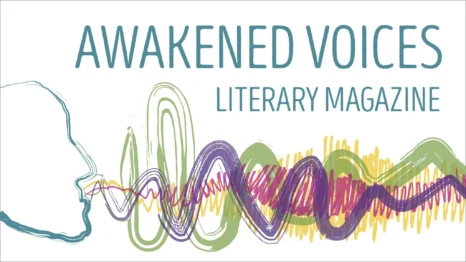I am a Survivor: An Anniversary in the Making
- Ellen Sauter, Nightingale
| In this response to our December and January prompt, Ellen Sauter discusses the strengthening anniversary of her survival. The piece opens in the midst of violence, but Sauter also shares the questions that came after. Over a process of coming to terms with trauma and what healing really looks like, Sauter chooses not to let an experience define her but still to include the truth of what happened in her story with plenty of self-compassion, affirmation, and worthiness. |

I am a Survivor: An Anniversary in the Making
by Ellen Sauter
I want to believe that I screamed or fought back in some way, but the truth is I have no idea if I did anything. For all I know I laid limp on a bed at a fraternity party, as a friend raped me, or I my greatest fear, maybe I asked for it. I knew from the moment I blacked in that something was different. I staggered out of some second-floor room and slowly walked down the main staircase. My stomach tightened and twisted as I attempted to wrap my head around what just happened. Chills crept up my body, traveling along my spine to my back. Tears welled up in my heavily makeup-ed eyes and my cheeks went white. My legs bruised and numb from what just happened wobbled to the door. Fear and shame poured out of me as I stumbled out of the fraternity party, across the quad and back to my home.
What the fuck happened? I couldn’t remember anything. Why did I get that drunk? Maybe I’m overreacting? I shouldn’t have worn that outfit. Was I asking for it? I lay awake in my sorority’s cold dorm with these thoughts consuming my conscious. As the sun slithered through the blinds, I extinguished a deep sigh and whispered to the darkness, I was raped.
All I wanted in that moment was to forget it happened. I knew that my teary-eyed entrance into the sorority house the night before alarmed many of my friends, and they would inquire how I was the following morning. The easiest way for me to put this all behind me, I concluded, was to pretend it didn’t happen and I wasn’t affected by it. For four years, I have pushed this memory out of my mind and have divisively avoided the topic. I thought that suppressing it would eliminate any trace of it. Although, as Gabrielle Union said in Not That Bad “Rape is a wound that throbs long after it heals. And for some of us the throbbing gets too loud.” That is what was happening. After I was raped, I refused to let it “affect me.” I didn’t want to stop partying or hooking up with boys because if I did, it would validate that what happened was real. I went about typical collegiate culture with ease; drinking obscene amounts of liquor and hooking up with men. I didn’t want this thing to define me. I didn’t want people to think I made it up. The sex I was having wasn’t even satisfying, I was only doing it because I wanted to prove that I had control over my decisions sexually, not because I felt empowered to do it. I was allowing my fears, shame, and guilt determine how I dealt with this trauma. It took me years and to find the right partner, to realize that I wasn’t comfortable with my own body anymore or that I had never been at all, and I needed to acknowledge my past in order to feel comfortable.
In the last four years, I have sat countless times in front of my computer brimming with emotions and thoughts about this incident but could not write a single sentence. It has taken me years to process independently what happened; to take the blame off of myself and to remove the shame and nervousness I have about it. Although, I am still anxious for how it will affect how people view me, I’m learning I can’t control that. In order for me to grow I have to heal. An asylee I worked with at the Refugee Resettlement Program in Chicago reminded me of the power of rebuilding life. He told me that “step by step he would do good things in America.” I can’t expect to be fully healed from my experience, to let it define me, or to suppress it. This year, for the first time ever, I have identified as a survivor, something I dismissed as an identity. Maybe it is beginning graduate school, or maybe it’s the stability and comfort from my partner. I am beginning to live in the darkness of my past and find the light in its significance. I can’t change what happened to me and it will not leave my existence. Yet, I can step by step allow it to grow with me, for it to not become me, but be a part of my story.
*
Ellen Sauter is a first year graduate student at University of Chicago Social Service Administration Program.

